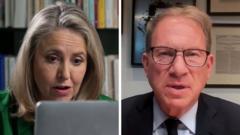"After accessing a private chat that included senior US officials discussing sensitive military operations, journalist Jeffrey Goldberg faces personal attacks from Trump administration figures, raising serious questions about national security protocol."
"Journalist Unveils Sensitive Military Chat, Faces Backlash from Trump Officials"

"Journalist Unveils Sensitive Military Chat, Faces Backlash from Trump Officials"
"Jeffrey Goldberg's exclusive access to a leaked Signal chat reveals classified military details, igniting a fierce counterattack from the Trump administration."
In an unprecedented turn of events, Jeffrey Goldberg, the editor of The Atlantic, recently found himself enmeshed in controversy after accessing a leaked Signal chat that contained sensitive military information shared by senior officials. What began as an extraordinary scoop quickly transformed into an avalanche of personal attacks against him by several prominent figures in the Trump administration, including President Donald Trump and National Security Advisor Michael Waltz.
Goldberg’s journey started when he received a message, which he initially believed to be a hoax, from what appeared to be Waltz’s account on the Signal messaging platform, renowned for its encryption capabilities. To his surprise, he was pulled into a group chat that included key figures like Secretary of State Marco Rubio, Secretary of Defence Pete Hegseth, and CIA Director John Ratcliffe, who were discussing the timing and specifics of an impending military operation in Yemen, seemingly unaware of his presence in the chat.
Following the publication of his article detailing the access and subsequent fallout, Goldberg has faced an onslaught of vitriolic responses. President Trump labeled him a "loser" and "sleazebag," while Waltz vehemently denied knowing Goldberg personally, despite the journalist stating that the two had met on multiple occasions. As Waltz attributed the blunder to an accidental addition of Goldberg to the group, he has since sought an investigation by tech mogul Elon Musk, leading to further ridicule from Goldberg himself.
Goldberg carefully chose to withhold specific operational details in his initial article, challenging the claims from Trump’s representatives that no classified information was shared. When pushback persisted, Goldberg decided to publish the full text of the messages, which detailed critical military timelines and strategies, asserting the relevance of the information to national security.
As criticism intensified, Goldberg rationalized the decision to publish: “Once you have senior officials saying nothing sensitive was shared, and we have the texts, we felt compelled to show them.” Meanwhile, despite the risks associated with the information shared in the chat, the Trump administration has tried to dismiss the severity of the leak, further perplexing national security observers.
In the midst of heated exchanges, Goldberg reflected on the broader implications of the incident, emphasizing the glaring discrepancies between accountability standards for high-ranking officials and lower-ranking military personnel, who would face severe repercussions for similar information mishandling.
Deciding it was best to exit the chat for the sake of ethical journalism, Goldberg remarked, “I made that decision with good advice,” indicating that he navigates the complexities of working with sensitive information carefully. As the fallout from this scandal continues, calls for investigation into the handling of sensitive information and the proper use of communication tools by government officials are growing, setting the stage for ongoing scrutiny of national security protocols under the current administration.





















